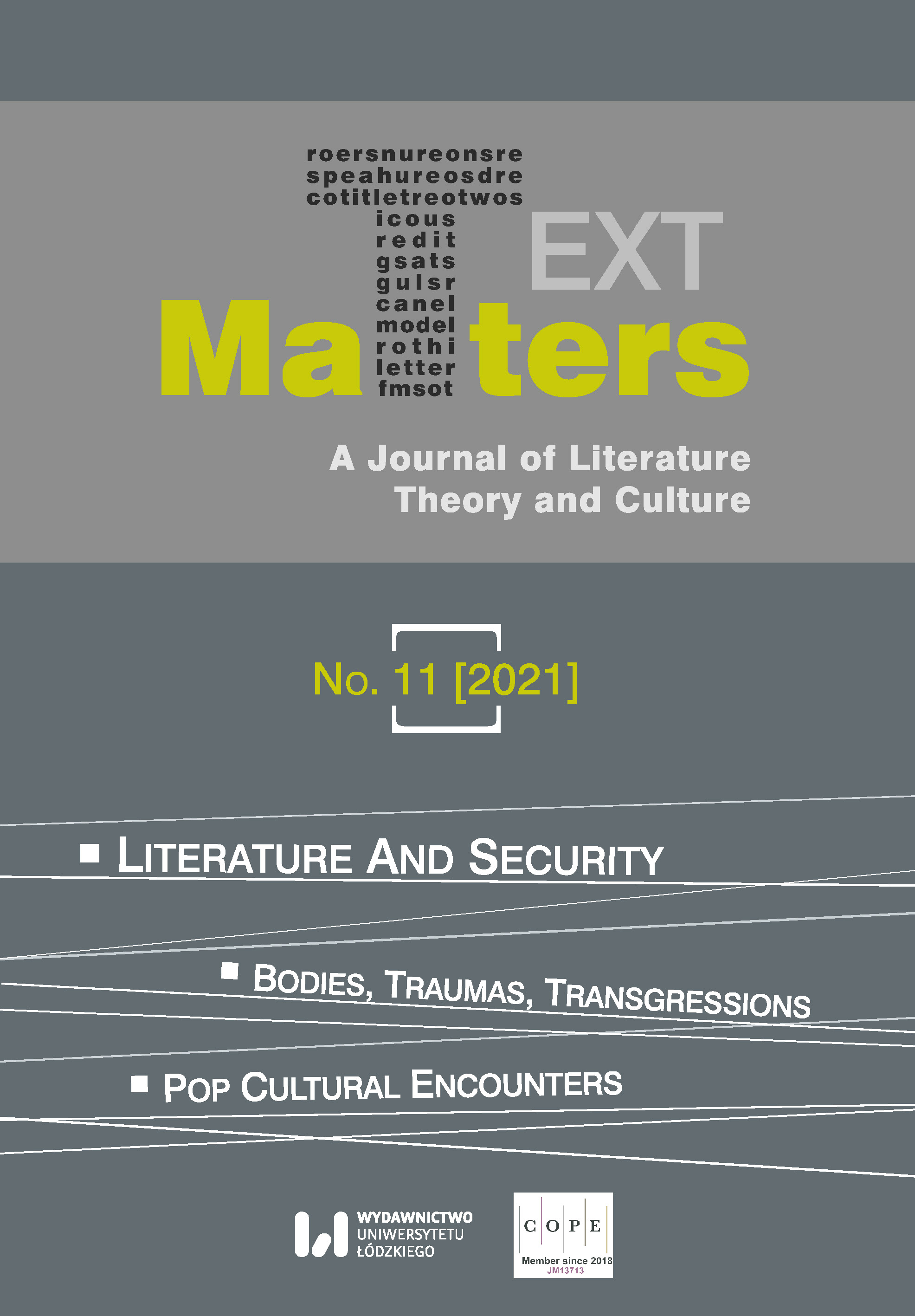One Hundred Frogs in Steve McCaffery’s The Basho Variations
DOI:
https://doi.org/10.18778/2083-2931.11.23Keywords:
haiku, frog, Steve McCaffery, Matsuo Bashō, translation, transcreation, transtranslation, eventAbstract
The article discusses Steve McCaffery’s The Basho Variations with a focus on various modes of transtranslation/transcreation/transaption of Matsuo Bashō’s famous frog haiku. The emphasis is placed on the complexities (of the processuality) of transtranslation which deliberately alters, distorts and reimagines the source text. The intercultural and intertextual quality of McCaffery’s poems is discussed in the context of multilevel references to classical Japanese aesthetics of haiku writing. The comparative reading of McCaffery’s and Bashō’s texts foregrounds the issue of events, or “frogmentary events,” and the importance of the role of the reader in completing poetic messages.
Downloads
References
Addiss, Stephen. Haiga: Takebe Sōchō and the Haiku Painting Tradition. Marsh Art Gallery/U of Richmond in association with U of Hawaii P, 1995.
Google Scholar
Barwin, Gary, and derek beaulieu. frogments from the frag pool: haiku after Bashō. Mercury, 2005.
Google Scholar
Blyth, R. H. A History of Haiku, Vol. 1: From the Beginnings up to Issa. The Hokuseido, 1963.
Google Scholar
Blyth, R. H. The Genius of Haiku. Readings from R. H. Blyth on Poetry, Life, and Zen. The British Haiku Society, 1994.
Google Scholar
Borkent, Mike. “At the Limits of Translation? Visual Poetry and Bashō’s Multimodal Frog.” Translation and Literature, vol. 25, no. 2, 2016, pp. 189–212. https://doi.org/10.3366/tal.2016.0246
Google Scholar
DOI: https://doi.org/10.3366/tal.2016.0246
Butling, Pauline, and Susan Rudy. Writing in Our Time: Canada’s Radical Poetries in English (1957–2003). Wilfried Laurier UP, 2005.
Google Scholar
Cox, Ryan. “Trans-Avant-Garde: An Interview with Steve McCaffery.” Rain Taxi, Winter 2007/2008, https://www.raintaxi.com/trans-avant-garde-an-interview-with-steve-mccaffery/ accessed 25 Sept. 2020.
Google Scholar
Crowley, Cheryl A. Haikai Poet Yosa Buson and the Bashō Revival. Brill, 2007. https://doi.org/10.1163/ej.9789004157095.i-310
Google Scholar
DOI: https://doi.org/10.1163/ej.9789004157095.i-310
Deleuze, Gilles, and Felix Guattari. Mille Plateaux. Éditions de Minuit, 1980.
Google Scholar
Deutsch, Eliot. Studies in Comparative Aesthetics. Monographs of the Society for Asian and Comparative Philosophy No. 2. U of Hawaii P, 1975.
Google Scholar
DOI: https://doi.org/10.1515/9780824851255
Drucker, Johanna. “Intimations of Immateriality: Graphical Form, Textual Sense and the Electronic Environment.” Reimagining Textuality: Textual Studies in the Late Age of Print, edited by Elizabeth Bergmann Loizeaux and Neil Friastat, U of Wisconsin P, 2002, pp. 152–77.
Google Scholar
Godard, Barbara. “Deleuze and Translation.” Parallax 14, Jan. 2000, pp. 56–81. https://doi.org/10.1080/135346400249289
Google Scholar
DOI: https://doi.org/10.1080/135346400249289
Godard, Barbara. “Translating Apollinaire after bpNichol.” One Poem in Search of a Translator: Rewriting “Les Fenêtres” by Apollinaire, edited by Eugenia Loffredo and Manuela Perteghella, Peter Lang, 2009, pp. 193–221.
Google Scholar
Henderson, Brian. “New Syntaxes in McCaffery and Nichol: Emptiness, Transformation, Serenity.” Essays on Canadian Writing, vol. 37, Spring 1989, pp. 1–29.
Google Scholar
Hiraga, Masako, and Haj Ross. “The Bashō Code: Metaphor and Diagram in Two Haiku about Silence.” Iconic Investigations, edited by Lars Elleström, Olga Fischer and Christina Llungberg, John Benjamins, 2013, pp. 25–42. https://doi.org/10.1075/ill.12.05hir
Google Scholar
DOI: https://doi.org/10.1075/ill.12.05hir
Hutcheon, Linda. A Theory of Adaptation. Routledge, 2006. https://doi.org/10.4324/9780203957721
Google Scholar
DOI: https://doi.org/10.4324/9780203957721
Johnson, Jeffrey. Haiku Poetics in Twentieth Century Avant-garde Poetry. Lexington, 2011.
Google Scholar
McCaffery, Steve. “Notes on Trope, Text, and Perception.” Open Letter, vol. 3, no. 3, Fall 1975, pp. 40–53.
Google Scholar
McCaffery, Steve. The Basho Variations. Book Thug, 2007. N. pag.
Google Scholar
McCaffery, Steve, and bpNichol. Rational Geomancy: The Kids of the Book Machine: Reports of the Toronto Research Group. Talonbooks, 1992.
Google Scholar
McCaffery, Steve, et al. 8x8: La Traduction a L’Epreuve. Ellipse, vol. 29/30, 1982.
Google Scholar
Kawamoto, Koji. The Poetics of Japanese Verse: Imagery, Structure, Meter. Translated by Stephen Collington, Kevin Collins and Gustav Heldt. U of Tokyo P, 2000.
Google Scholar
Kawamoto, Koji. “The Use and Disuse of Tradition in Bashō’s Haiku and Imagist Poetry.” Poetics Today, vol. 20, no. 4, Winter 1999, pp. 709–21.
Google Scholar
Liu, Chen-ou. “The Ripples from a Splash: A Generic Analysis of Basho’s Frog Haiku.” Ripples from a Splash: A Collection of Haiku Essays with Award-Winning Haiku, by Chen-ou Liu, A Room of My Own, 2011, pp. 51–58.
Google Scholar
Miki, Roy, editor. Meanwhile: The Critical Writings of bpNichol. Talonbooks, 2002.
Google Scholar
Nichol, bp. The Captain Poetry Poems. Blewointment, 1970.
Google Scholar
Nichol, bp, editor. The Cosmic Chef: An Evening of Concrete. Oberon, 1970.
Google Scholar
Odin, Steve. Artistic Detachment in Japan and the West: Psychic Distance in Comparative Aesthetics. U of Hawaii P, 2001. https://doi.org/10.1515/9780824861506
Google Scholar
DOI: https://doi.org/10.1515/9780824861506
Sato, Hiroaki. One Hundred Frogs: From Renga to Haiku to English. Weatherhill, 1983.
Google Scholar
Shirane, Haruo. “Beyond the Haiku Moment: Bashō, Buson, and Modern Haiku Myths.” Haiku Reality, Summer 2011, http://haikureality.theartofhaiku.com/esejeng79.htm accessed 25 Sept. 2020.
Google Scholar
Shirane, Haruo. “Matsuo Bashō’s Oku no Hosomichi and the Anxiety of Influence.” Currents in Japanese Culture: Translations and Transformations, edited by Amy Vladeck Heinrich, Columbia UP, 1997.
Google Scholar
Shirane, Haruo. Traces of Dreams: Landscape, Cultural Memory, and the Poetry of Bashō. Stanford UP, 1998.
Google Scholar
DOI: https://doi.org/10.1515/9781503616905
Stein, Gertrude. “Composition as Explanation.” A Getrude Stein Reader, edited by Ulla E. Dydo, Northwestern UP, 1993, pp. 493–503.
Google Scholar
Stout, John. “Rewriting and Postmodern Poetics in Canada: Neo-Haikus, Neo-Sonnets, Neo-Lullabies, Manifestos.” Public Poetics. Critical Issues in Canadian Poetry and Poetics, edited by Bart Vautour, Erin Wunker, Travis V. Mason and Christl Verduyn, Wilfrid Laurier UP, 2015, pp. 87–106.
Google Scholar
Suzuki, Daisetz Teitaro. Zen and Japanese Culture. Routledge/Kegan Paul, 1959.
Google Scholar
Toronto Research Group (bpNichol and Steve McCaffery). “Report I: Translation.” Open Letter Second Series, no. 4, Spring 1973, pp. 75–93.
Google Scholar
Watts, Alan. “Matsuo Bashō: Frog Haiku (Thirty-two Translations and One Commentary).” Bureau of Public Secrets, http://www.bopsecrets.org/gateway/passages/basho-frog.htm accessed 10 Oct. 2020.
Google Scholar
Yasuda, Kenneth. “‘Approach to Haiku’ and ‘Basic Principles.’” Japanese Aesthetics and Culture: A Reader, edited by Nancy G. Hume, State U of New York P, 1995, pp. 125–50.
Google Scholar
Published
How to Cite
Issue
Section
License

This work is licensed under a Creative Commons Attribution-NonCommercial-NoDerivatives 4.0 International License.













